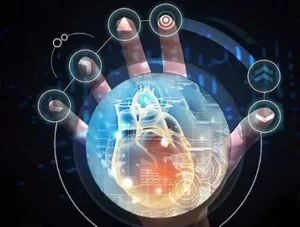Exploring the Benefits of AI-Powered Mental Health Care
The use of artificial intelligence (AI) in mental health care is becoming increasingly popular as a way to provide more efficient and effective care. AI-powered mental health care has the potential to revolutionize the way mental health services are delivered, providing more personalized and accessible care to those in need. In this article, we will explore the potential benefits of AI-powered mental health care and how it can help improve the quality of care for those suffering from mental health issues.

One of the primary benefits of AI-powered mental health care is its ability to provide more personalized care. AI-powered systems can analyze a patient’s data and provide tailored advice and treatment plans that are tailored to their individual needs. This can help ensure that the patient receives the most effective care possible. Additionally, AI-powered systems can provide more accurate diagnoses and treatment plans, as they are able to analyze a patient’s data more quickly and accurately than a human doctor.
Another benefit of AI-powered mental health care is its ability to provide more accessible care. AI-powered systems can be used to provide mental health services to those who may not have access to traditional mental health care. For example, AI-powered systems can be used to provide mental health services to those living in rural areas or those who may not have access to traditional mental health care due to financial or other barriers.
Finally, AI-powered mental health care can help reduce the cost of care. AI-powered systems can help reduce the cost of care by providing more efficient and accurate diagnoses and treatment plans. This can help reduce the overall cost of care, as well as reduce the amount of time and resources needed to provide care.
Overall, AI-powered mental health care has the potential to revolutionize the way mental health services are delivered. By providing more personalized and accessible care, as well as reducing the cost of care, AI-powered systems can help improve the quality of care for those suffering from mental health issues.
Examining the Potential Risks of AI-Based Mental Health Treatment
The potential risks of AI-based mental health treatment are a growing concern among medical professionals and the public alike. Artificial intelligence (AI) is increasingly being used to diagnose and treat mental health conditions, but the technology is still in its infancy and the potential risks are not yet fully understood. This article will examine the potential risks of AI-based mental health treatment and discuss the need for further research and regulation.

One of the primary concerns with AI-based mental health treatment is the potential for bias. AI algorithms are only as good as the data they are trained on, and if the data is biased, the results of the AI-based treatment may be as well. For example, if an AI algorithm is trained on data that is biased towards a certain gender or race, it may produce results that are biased in the same way. This could lead to unequal access to mental health treatment or even incorrect diagnoses.
Another potential risk of AI-based mental health treatment is the lack of human interaction. AI-based treatments are often automated and do not involve any direct interaction with a mental health professional. This can lead to a lack of empathy and understanding, which can be detrimental to the patient’s mental health. Additionally, AI-based treatments may not be able to recognize subtle nuances in a patient’s behavior or language that a human mental health professional would be able to detect.
Finally, there is the potential for AI-based treatments to be used in unethical ways. AI-based treatments are often used to diagnose and treat mental health conditions without the patient’s consent. This could lead to the misuse of sensitive patient data or the misuse of AI-based treatments for purposes other than mental health treatment.
Given the potential risks of AI-based mental health treatment, it is important that further research is conducted and that regulations are put in place to ensure that AI-based treatments are used ethically and safely. Additionally, it is important that mental health professionals are involved in the development and implementation of AI-based treatments to ensure that the technology is used in a way that is beneficial to the patient.
How AI is Changing the Way Mental Health Professionals Diagnose and Treat Patients
The use of artificial intelligence (AI) in the field of mental health is revolutionizing the way mental health professionals diagnose and treat patients. AI is a form of computer technology that is capable of performing tasks that normally require human intelligence, such as recognizing patterns, making decisions, and solving problems. AI has the potential to revolutionize the way mental health professionals diagnose and treat patients by providing more accurate diagnoses, more personalized treatments, and more efficient care.
AI can be used to diagnose mental health conditions by analyzing patient data and identifying patterns that may indicate a mental health disorder. AI can also be used to monitor patient progress and provide personalized treatment plans. For example, AI can be used to track a patient’s symptoms over time and provide tailored treatment plans based on the patient’s individual needs. AI can also be used to provide more efficient care by automating certain tasks, such as scheduling appointments and providing reminders.
AI can also be used to provide more personalized treatments by analyzing patient data and providing tailored recommendations. For example, AI can be used to analyze a patient’s medical history and provide personalized treatment plans based on the patient’s individual needs. AI can also be used to provide more accurate diagnoses by analyzing patient data and identifying patterns that may indicate a mental health disorder.
Overall, AI is revolutionizing the way mental health professionals diagnose and treat patients. AI has the potential to provide more accurate diagnoses, more personalized treatments, and more efficient care. AI is also helping to reduce the stigma associated with mental health conditions by providing more accurate diagnoses and personalized treatments. As AI continues to evolve, it will continue to revolutionize the way mental health professionals diagnose and treat patients.
The Impact of AI on Mental Health Care Accessibility
The impact of artificial intelligence (AI) on mental health care accessibility is a topic of increasing importance. AI has the potential to revolutionize the way mental health care is delivered, making it more accessible and affordable for people around the world.
AI can be used to diagnose mental health conditions, provide personalized treatment plans, and even provide virtual therapy sessions. AI-based diagnostic tools can help identify mental health issues more quickly and accurately than traditional methods. This can help reduce the time it takes to get a diagnosis and start treatment. AI-based treatment plans can be tailored to the individual, taking into account their unique needs and preferences. This can help ensure that the treatment is more effective and better suited to the individual.
AI can also be used to provide virtual therapy sessions. This can be especially beneficial for those who live in remote areas or who have difficulty accessing traditional therapy services. Virtual therapy sessions can be conducted via video chat or text messaging, making them more convenient and accessible. AI-based virtual therapy sessions can also be more affordable than traditional therapy sessions, making them more accessible to those with limited financial resources.

Overall, AI has the potential to greatly improve mental health care accessibility. AI-based diagnostic tools, personalized treatment plans, and virtual therapy sessions can all help make mental health care more accessible and affordable for people around the world. This could have a significant impact on reducing the stigma associated with mental health issues and improving the overall mental health of individuals and communities.
The Role of AI in Mental Health Research and Development
Artificial Intelligence (AI) is playing an increasingly important role in mental health research and development. AI is a form of technology that enables machines to learn from experience, adjust to new inputs, and perform tasks that would normally require human intelligence. AI has the potential to revolutionize the way mental health research and development is conducted, as it can provide insights into the underlying causes of mental health issues and help develop more effective treatments.
AI can be used to analyze large amounts of data quickly and accurately, allowing researchers to identify patterns and correlations that may not be visible to the human eye. For example, AI can be used to analyze patient records, medical images, and other data to identify risk factors for mental health issues. AI can also be used to develop more accurate diagnostic tools, as well as to identify potential treatments and interventions.
AI can also be used to develop more personalized treatments for mental health issues. AI can be used to analyze a patient’s medical history, lifestyle, and other factors to develop a personalized treatment plan that is tailored to the individual’s needs. This can help ensure that the patient receives the most effective treatment possible.
AI can also be used to develop virtual reality (VR) and augmented reality (AR) applications that can be used to help people with mental health issues. For example, VR and AR can be used to create immersive environments that can help people with anxiety and depression manage their symptoms. AI can also be used to develop chatbots and other digital tools that can provide mental health support and advice.
In conclusion, AI is playing an increasingly important role in mental health research and development. AI can be used to analyze large amounts of data quickly and accurately, develop more personalized treatments, and create virtual reality and augmented reality applications that can help people with mental health issues. AI has the potential to revolutionize the way mental health research and development is conducted, and it is likely to become an even more important tool in the future.







